- Comics
- Comics Reviews
- Manga
- Comics Reviews
- European Comics
- News
- Comics News
- Press Releases
- Columns
- Spotlight
- Digital Comics
- Webcomics
- Cult Favorite
- Back Issues
- Webcomics
- Movies
- Toys
- Store
- More
- About
By Jason Mott
June 26, 2007 - 22:06
Conan.
Utterance of the name alone is enough to transmogrify one’s hair to
a rich, jet black color, increase testosterone output by thirty
percent (in both men and women) and generate fifteen pounds of lean
muscle mass…by Crom. So what type of man could possibly handle the
writing of such a larger-than-life character? A character older than
Superman and more scantly clad than Paris Hilton at Mardi Gras? (But,
in Conan’s defense, who wouldn’t run around in a loin cloth at
the first available opportunity? I know I would.)
Well, currently, the man holding sway over the realm of high adventure is comic book veteran Tim Truman — a heavyweight comic mercenary best remembered by fans for the inimitable GrimJack. And, in case you were curious, uttering the name GrimJack causes the opening of random interdimensional portals and a stern, stoic facial expression that the ladies find irresistible.
All comedy aside, Conan writer Tim Truman was nice enough to take time out of his busy schedule to answer a few questions for the Bin about Cimmerians, Robert E. Howard’s tradition and future adventures.
Comic Book Bin: Most times, things should begin at the beginning. So, my first question is how did you become the writer of Conan? Did you seek out the brawny Cimmerian or did he come and get you?
Timothy Truman: Actually, a bit of both. After I finished the last issue of Grimjack: Killer Instinct, I noticed I had a few months in my schedule to play with. At about that time, ads for P. Craig Russell's Jewels of Gwahlar were appearing. On a lark, I contacted Scott Allie to tell him I was a hard core fan of Robert E. Howard's Conan stories and to offer my services if they needed a fill-in issue or if they planned to do any more miniseries. Scott was on vacation at that time, but, lo and behold, he got back to me immediately upon his return to the office to say that he'd love to work something out. I put some other projects on hold and we got Joe R. Lansdale involved. The Conan and the Songs of the Dead miniseries was the result.
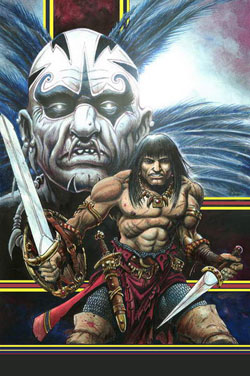 |
Well, at about the time I was finishing the first issue of the fill-ins, I heard a rumor from a friend that Kurt had been offered a contract at DC and had made the painful decision to leave Conan. Since I was waiting on Kurt's second script at the time, I called Scott to see if any truth to it. Scott told me that the rumor was true, and that Kurt was leaving amicably, which was good to hear. Then he told me "As a matter of fact, there's something else we want top talk to you about." Kurt and Scott had been talking about writers to take the book over, and my name was at the top of the list. It blew me away. I hadn't been expecting it.
A
week later I was in Portland talking with Scott, Kurt, Scott's
assistant Matt Dryer and Dark Horse editor Mike Richardson. They
decided I was the man for the job. So here we are. I'm a happy little
Robert E. Howard fan.
CBB:
Robert
E. Howard throws a long shadow and many hardcore Conan fans are
extremely loyal to his vision of the character. As a writer coming to
the franchise, how much of the pre-established history and tradition
of the character is a help and how much of it is a hindrance? Or is
it not a hindrance at all?
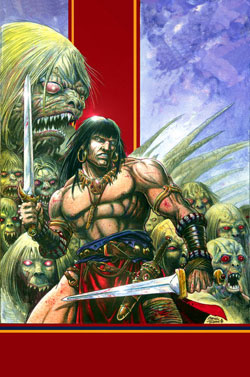 |
CBB: What goes into writing an issue of Conan? How do you go about creating the infamous “days of high adventure?”
Truman: Well, it's harder than it might seem. We try to do adaptations in a chronological fashion, as suggested by one of the approved Conan chronologies. However, there are portions of Conan's life between the actual Howard stories that we want to fill in. This is fun, because it gives us a broader overall tale and to flesh out things that Howard left us in his own writings--those little clues that I mentioned above. By the same token, fleshing out the overall saga is challenging, because my goal is to stay as true to Howard as possible.
Dark Horse wanted to bridge the main arcs with one or two-issue fill-in tales. Instead of doing "throwaway" tales that would be of little consequence to the overall saga, I opted to move things up to the "King Conan" phase for the fill-ins that Paul Lee and I did. Fans had been wanting to see some King Conan stories, and it gave me a chance to explore some things I'd been thinking about.
In the future, though, we're doing less fill-ins. For various reasons we had to come up with a few more than we'd planed on doing, and it started interfering with the momentum of the overall story. That bothered all of us. So we've come up with some solutions that will allow us to proceed full steam ahead. Fans are in for a great ride, I guarantee it.
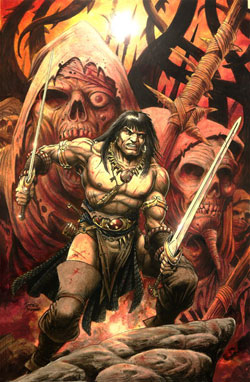 |
Truman: I think it has to do with the fact that Conan is a truly free man with a very clear-cut code of ethics and a very direct way of handling life. That appeals to folks. Conan doesn't play the game that most of us have to play in our day to day lives. He lives, he loves, he fights. Once he has his sights set on a goal, nothing deters him. He's unstoppable. All of us want to be like that. In a weird sense, he's the ultimate sports hero. He's all about the drive to win, no matter the obstacle. That's inspiring.
By the same token, he's a very complex character--far more complex than he might seem at first glance.
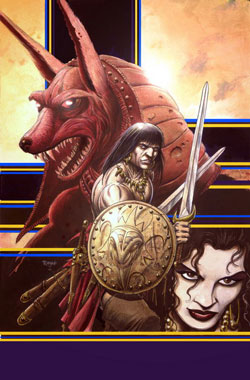 |
Truman: It's funny, but I always think of Conan in wolf metaphors as well, and always have. However, he's not always a lone wolf. He's the alpha wolf. With few exceptions, the characters whom he allows to become part of his pack in the original Howard stories make out just fine. That's one reason why I wanted to give the death of his friend, Nestor the Gunderman (in the Rogues in the House prelude issues, Conan #37-38) so much impact.
Howard's rotating supporting helped give the Conan saga much of its charm and longevity. In the end, it became one of the essential elements for this impression that REH left us with, that Conan was a world traveler whose adventures took him across the length and breadth of his world.
To get back to one of the questions you asked above, that's another factor that I think has contributed greatly to Conan's iconic longevity: this character saw every inch of his world and mastered every situation he became part of, no matter the place, no matter the culture. That's something we'd all like to do.
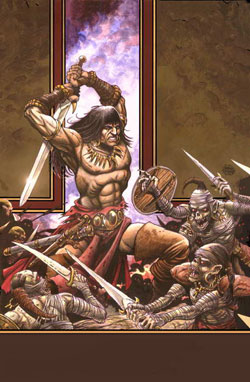 |
Truman: That the stories stayed true to character and faithfully reflected what Howard came up with. However, I want them to see that I've peeked under the surface of the stories a bit, and exposed some new layers to Conan's motivations overall saga. As I've said elsewhere, I don't want to ape Howard. Doing so would diminish my own work as well as his. However, I want to find and use the same paintbox that he did.
CBB: What books, or even movies for that matter, do you feel have influenced your handling of Conan? When Writer’s block rears its frustrating head, what influences do you turn to?
Truman: Usually, I run straight to the source, Howard. I read one of two of his Conan stories, find something that I hadn't noticed before. Howard's Conan stories are layered with poetry and this broad history that he came up with. You'll notice connections between characters, situations, or events that might have slipped past you before. Howard’s writing drives ahead full tilt, you see, and when you're on the trip with him you sometimes speed past these lovely, subtle signposts and touchstones that he left along the side of the road.
I'll also read various essays and treatises about the character from the most respected Howard scholars. Their insights can lead you down some interesting new avenues of thought, even when you might not agree with them.
Otherwise,
I get as far away from the work as I can for a few hours. As I used
to tell my students, the harder you chase a rabbit, the faster and
farther it runs away from you. I go on a walk with my best buddy, my
old dog, Tucker (who, sadly, isn't doing too well these days). I've
solved a lot of problems on 30 minute walks with Tucker. We're
moseying along, I'm watching him sniff for birds and squirrels, my
mind wanders away from the story point or section of dialogue that
I'm trying to work out, and boom, the solution hits me. Doing
something mundane like mowing the lawn is good for that, too. Just
get away from the paper, stop chasing, and it's almost as if the
solution gets curious about why you're not running after it anymore
and circles back to find out what's up.
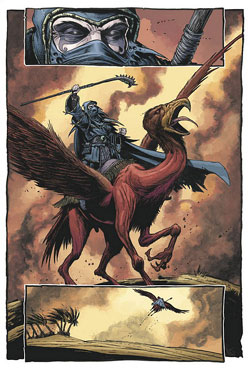 |
CBB: Without giving too much away, what can we expect to see in Conan's future, both in terms of upcoming stories and in terms of general character development?
Truman: Well, this month saw the first issue of our 4-part adaptation of Rogues in the House. It was great to see the positive review which your website gave it-- thanks for that. Rogues is a particularly cool story because in the original story, Howard very subtly laid out one of his basic philosophies: that despite man's achievements and the scientific and cultural wonders our civilizations come up with, in the end it's barbarism that will prevail. He wouldn't spell out the theme more clearly until one of his much later Conan stories, Beyond the Black River.
After that, a brief, scheduled break while Kurt Busiek finally wraps up the popular "Born on a Battlefield" storyline. Then we're embarking on a whole new saga. In a passage from a letter that Robert E. Howard wrote to a fan in the 1930's, he decreed that immediately following the events of Rogues in the House, Conan briefly returned to Cimmeria. It occurs right at a time when, according to Howard's timeline, Conan switches careers--from wandering thief to mercenary. REH told us that Conan went through certain definite career phases during his lifetime. The "mercenary era" marks phase two.
His return offers us some exciting questions and possibilities. Why did he return? And once he'd returned, why didn't he stay? It seemed a wonderful chance to explore some unique psychological insights. Everything builds from the betrayals he experiences as part of the Rogues in the House storyline.
Like I said before, it's going to be a great ride.
CBB: Final question—and I ask this question because several friends have threatened me with physical violence if I did this interview and didn’t ask—GrimJack…gone for good or just gone for now?
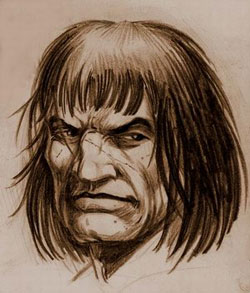 |
In the meantime, tell your curious friends to go to my website, http://www.timothytruman.com , and they can read all about stuff as it happens. They can also enjoy seven galleries of my artwork, both new and old. There's a "Grimjack Gallery" where they can see select pieces from the new project, and I update it frequently with new images. While they're at my site, they can also join my mailing list, the TT Artlist.